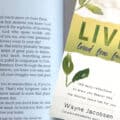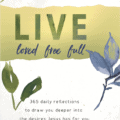By Wayne Jacobsen
BodyLife • September 1996
“The wish to be free of God is the deepest yearning of man. It is greater than his yearning for God.”
The sentence leapt off the page and nearly took my breath away. I was reading Helmut Thielicke’s, Between God and Satan, a provocative study of the temptations of Jesus. Thielicke was a German theologian who lived through the horrors of World War II as an active resistor of his own government. A depth of faith forged in the struggle of those years permeates everything he writes.
I was enjoying this book tremendously until I came to this statement. As one who teaches on intimacy with God often, I like to think it fulfills the deepest longing of the human heart. Who wouldn’t want to know the Creator personally; to sense the majesty of his presence; hear his tender voice and watch his power accomplish things we could never even imagine? What else could anyone really want?
Before I knew it I was arguing with Professor Thielicke, trying to reject his conclusion. But the more I thought about it the more sense it made. His conclusion does answer some compelling questions: Even though I do really want to know God better, why do I often make choices that lead me further from that reality? Why do I get into circumstances and so easily trust my common sense, than really wait to hear what God might have to say about it? In short, why is it so difficult to follow someone we desire to love so much?
I know there is a deep longing in my heart to know God, but could there also be a deeper yearning still?
The Quest for Control
There was for Adam and Eve. It wasn’t enough that God had given them each other, a garden to live in or even daily moments of fellowship with himself. They wanted something more. Something God said they shouldn’t take to themselves or they would die.
But they did anyway. No where do we read that Adam and Eve wanted to reject God. Quite the contrary they just wanted to be more like him, and this knowledge of good and evil just might be the trick. Here was a simple way to get it. All they had to do was eat the fruit before them. They wanted control of their destiny, freedom from God to earn their own way by their own hand!
And of course it was God that gave them the power to do so. He gave them the freedom of self-determination the gift of choice. He not only invited them to trust him, but he also provided the fruit of that tree as a means for them to gain knowledge apart from him. He warned them not to, but then watched as the enemy coaxed out of Eve her distrust of Father. “God just knows that when you eat of it you’ll be like him.” He’s holding out on you, Eve.
The choice was clear. Trust Father and spurn the devil’s temptation; or trust her own insight and strength to get what she could do for herself. Adam wasn’t long in following after her, and though they gained the knowledge they sought, that knowledge became their bondage. They had no power to choose the good over the evil. Their desire to take control of their lives was greater than their desire for God.
I’ve weathered that same struggle. Sometimes I’ll just start praying about a situation, when my mind is already scheming about phone calls I can make or a letter I could write to fix it. Too often it was only after I have tried those things and made things worse that I quiet myself enough to listen to God’s wisdom.
Don’t we hate being in any kind of situation where we are not in control. Fear and anxiety overwhelm us and we waste all kinds of effort scheming or manipulating others to put ourselves back in control. Haven’t we all learned how horrible it can be to be at the mercy of circumstance or other people? If you don’t control you’re own destiny people will take advantage of you, and use you for theirs.
The yearning in our hearts to be free of God springs from this fountain. It’s not that we reject God; it’s more that we want control of our own lives. We want that and God too, and there is the deception. We don’t realize that the affections are mutually exclusive.
The Insidious Reversal
When we seek control of our own lives, and at the same time attempt to foster a relationship with Father we put ourselves above him. We know what is best for us, and if God doesn’t satisfy our expectations we doubt his love for us, our love for him, or both. Every difficult circumstance, then becomes a cause for despair and disillusionment. We enlist his help to change the circumstances or what others are doing and are frustrated when he doesn’t honor our attempts. Or worse yet, we assume his favor when someone does give in to our manipulation, thinking we’ve won a great victory.
But notice what has happened in this whole process? By wanting God to be the vehicle for our agenda, we turn the Almighty God into our personal fairy godmother. We think he exists to turn our pumpkins into carriages, and our mice into white stallions. Of course we still want God, but not as God. We want him to fulfill our needs our way. We want his power to serve our comfort and convenience.
Jesus didn’t see it that way, which is why he seemed to say some really strange things by our standards. “Blessed are you when you are at the end of your rope. With less of you there is more of God and his rule.” That’s Eugene Peterson’s translation of Matthew 5:3. How many of us genuinely feel blessed when we are at the end of our rope? How many people do you find sharing how great their week was because they had lost control of key situations in their life?
No, our sense of being blessed is often derived from how ‘in control’ we feel. If we have enough money, friends, health and possessions we feel secure. When we don’t have those things we’re afraid and have to work even harder to maneuver our circumstances to a more secure place.
I’ve come to realize that I have spent most of my life working against Father’s plan for my life and I didn’t even know it. I was trying to help God (see how twisted that is!) get me to a place where everything in my life was wonderful and easy. In short, I wanted to be so secure in my circumstances that I wouldn’t need him every day. All the while he was trying to teach me that I needed him, and that there is no other place in the world more secure than that regardless of what the external circumstances look like.
Regrettably, we only seem to realize that when our attempts to control ourselves fail miserably. According to Jesus that’s the best place for us to be, so he is merciful to show us over and over again that our efforts will never be good enough. When we finally give in, no longer trusting our insights or our abilities we are in the best place to see God’s hand more clearly. Then we can give way to his rule, or purpose, in us. The secret to intimacy with Father is to give up on our ideas of what is best for us and surrender completely to the Father’s purpose even when we may not understand it.
I remember how risky all of that used to sound to me. Even the thought of surrendering completely to God conjured up fears of missionary service in a distant land or menial labor closer to home. Trust used to be so scary. Not anymore.
Life at the End of the Rope
Whenever I talk with other pastors who hunger to see the body of Christ as a dynamic people growing together in loving the Father and sharing his life together, one question almost always surfaces. “If all the body shares responsibility together, how do we justify our salaries?” Sometimes we laughed it off, too uncomfortable with the subject. In more secure times we engaged serious discussion about how great it would be for the body not to have the image of full-time Christians trying to be the body of Christ to everyone else. But we never did anything about it because we were afraid of losing control of our lives.
Instead we’d have to work harder and do more than others to justify our position and our pay. I felt pressure to teach or lead activities, so people would think we were earning our keep. It’s a vicious cycle. The more I did, the more people let me do. The more they let me do, the less opportunity there was for others to grow in their gifts, and the less of a body we became.
Almost two years ago now, it became clear that Sara and I were on a different track than others on the leadership team of the church I’d helped plant 15 years before. We tried everything we knew to do to fix the problem or make room for the differences, but every attempt failed. God clearly put it on Sara and my heart to let go and give everything up–ministry, friendships, reputation, and salary. It was the hardest and most painful thing we have ever done.
Never before had I truly been at the end of my rope. I’ve been a couple of inches down it before, but now I knew I’d never been close to the end. Everything I had controlled about my life through 20 years of vocational ministry was gone in a single day. We cried out to God to fix the circumstances, but he didn’t. Oh, he took care of us well enough. We never missed a meal, nor a house payment. He graciously used our lives to encourage others even as he brought others to encourage us.
The first six months were horrible. We might have put up a bold front at times, but the anxiety was great. Both books I had published were out of print. Few churches were inviting us to come and teach, and I was no longer sure I believed in the church system I had invested so much time in training others to embrace.
I’d lost control of my life and was miserable for it. You would never have convinced me before that I was in control of it. I couldn’t see it until I lost it. I tried a number of things to get it back and all of them either failed, or someone stopped me before I made things worse. Through it all Father kept dealing with my trust in him. “Stop trying to control your life, Wayne. That’s my job. All you have to do is trust me enough to let me.” I kept trying to explain to him that it would be easier to yield to him if I had more control.
I don’t know how. I’m not even sure exactly when, but somehow the words finally sank through my unbelief. The last year has been an absolute joy seeing God open doors, provide for us, and teach us how to live life outside of our own control and under the security of his. Looking back now through every painful moment, I am incredibly thankful for what God has taught us.
I have never known such freedom. No longer burdened by my attempts to earn my way, I can enjoy the grace of God. No longer having to manipulate people to fit into my plans, I can simply love them and free them to discover God’s will and live in it with joy. No longer finding security in a salary, I have only to obey him every day and rejoice as he provides. And no longer being in charge of a fellowship, I can be only what Father has made me to be in the body and not fit a cultural role that no man can honestly bear.
Losing Control, Gaining a Father
When Kevin Smith, a friend from Australia, was here this summer he said something that intrigued me. Because we don’t really trust Jesus to be the head of his church, we devise systems to keep it under man’s control on his behalf. Which means much of our structures for body life today are actually built on unbelief.
Sometimes I feel like such a fool that I had been in ministry so long without learning that Jesus rules to the extent that I let go. He said it clearly, “Whoever wishes to save his life shall lose it; but whoever loses his life for my sake will find it.” I thought I knew what that meant, but if I’d have listened carefully my anxieties would have proved me wrong. Fear is certain evidence that I’m moving out of my own wisdom and expectations, instead of moving out of my trust and security in the Father’s watchfulness over and care for my life.
As long as we’re trying to manipulate circumstances around us, we’ll find our spiritual life shriveling up. That’s as true of our job as it is our ministries and our children. That’s because we’re trying to be free of Father to pursue our own will and desires. That road always looks secure but leads to ruin. I am so thankful that he has provided a better way.
Even out of our own failures, our Father can work his purpose. That’s what he did for Adam and Eve. In fact he knew his first invitation to trust would be ignored. He knew it would cost him his Son before we would be able to understand how much we are loved and how safe it is to put all of our trust in him. He also knows how slow we are to learn that, and with great patience continues to invite us past our fears and anxieties, past the need to control every circumstance of our lives, and surrender to his work and purpose.
What are you afraid of today? Where does your life feel out of control? Right there, at the end of your rope, let go and fall into the lap of a loving and powerful Father. “I’m so sorry God for trying to fit everything in my image; so tired of finding my security in the fickleness of circumstance. Show me, Father, how I am manipulating others and teach me how to find all my joy and security in you and you alone.”
He knows everything about you. He knows every circumstance that assails you and he will use them all to teach you how to trust him, if you’ll let him. He will never take control of your life; that’s something you must give up to him every day, circumstance by circumstance. Give up trying to grab what you desire most. Do it and you’ll find that real security doesn’t come in the money we possess, the church we attend, or the circumstances we manipulate. Security is found in the Father alone.
Then build your life anew not on the fears of unbelief, demanding your expectations be fulfilled, but on the presence of a Father who is more awesome than you ever imagined. There you’ll find a peace and rest that no circumstance or person can disturb.
Finally, you’ll discover what it is to be free of the need to control your own life. You’ll find that Father really does know best and that he can work in you better than you ever asked or imagined.
Then and only then will your deepest desire be to know God more fully.
Download Article:
- Download Article PDF (82 KB)







The desire to be free FOR God
is not our natural default,
yet one touch of Him
can change hearts of stone to flesh
in those who stop and listen,
who, beyond the realm of self,
become receptive servants
and dare to doubt,
mistrustful of their own wisdom.
The reins/reigns have changed!
we lose to live
and live without coercion.